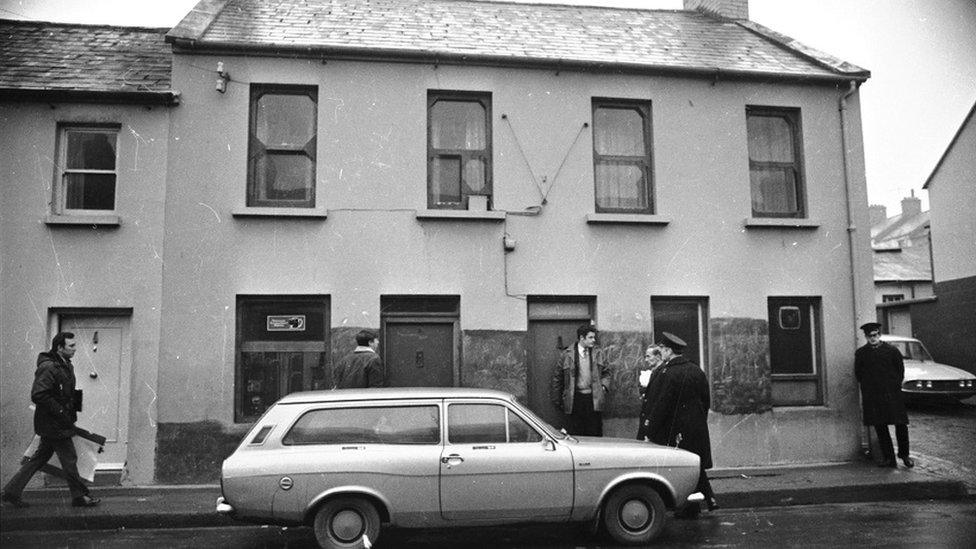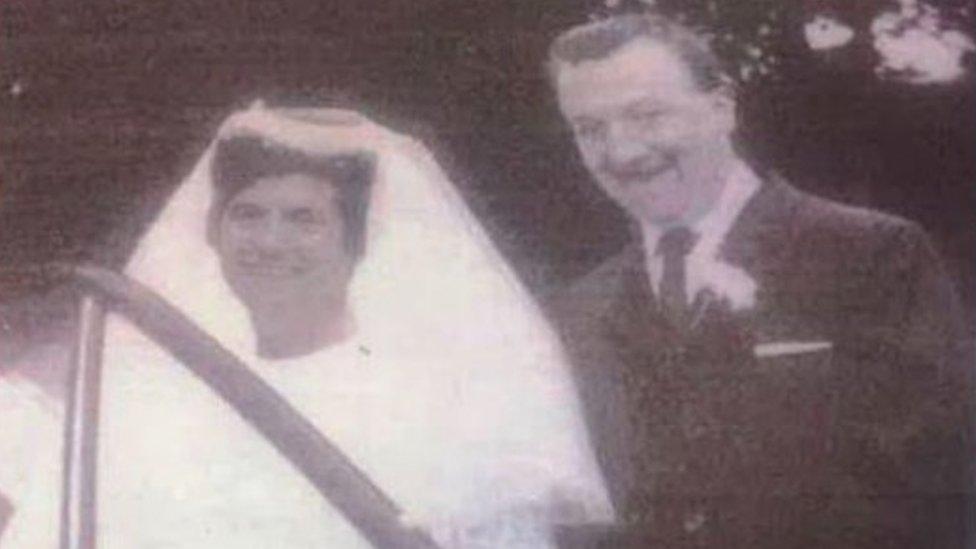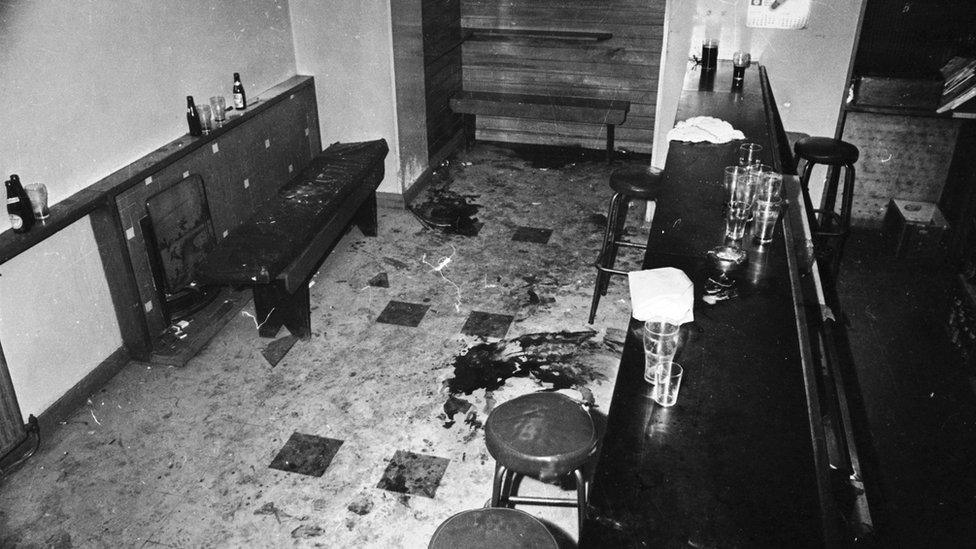Annie's Bar: Fresh call to review investigation on 50th anniversary
- Published

Five men were killed by loyalist gunmen in Annie's Bar on December 20, 1972
The daughter of a man killed in a loyalist gun attack in Londonderry 50 years ago has called for the police investigation to be re-examined.
Michael McGinley was one of five men shot and killed in Annie's Bar on 20 December 1972.
His daughter, Gillian McElholm, said reopening the case could help to bring justice for the men and their families.
No one has ever been brought to justice for the shootings.
The five men - Michael McGinley, 37; Charles McCafferty, 30; Charles Moore, 31; Frank McCarron, 58; and 26-year-old Bernard Kelly - had been watching a football match when loyalist gunmen opened fire with a sub-machine gun and a pistol.
Some of the victims' families met with the Police Service of Northern Ireland (PSNI) district commander for Derry City and Strabane Nigel Goddard last week.
'Never got that Christmas with me'
Speaking to BBC Radio Foyle, Ms McElholm said she was just seven months old when her father was killed as he sat in the bar.
She said her family described him as "a lovely man" who was "very approachable".
"He was actually playing with me the night before he actually went to the bar," Ms McElholm said.
"I never got the first Christmas with him, he never got that first Christmas with me."

Michael McGinley and his wife Pat were planning their first Christmas with the their new-born daughter, Gillian
Ms McElholm said that "everything was ripped away from their family" when her father was killed.
She said she would love to find out who killed her father and wants to know how anyone "could actually feel going in and doing that, knowing they had ripped so many lives apart".
Ms McElholm said she now wants the investigation into the killings to be reopened by the police.

The victims had been watching a football match when loyalist gunmen opened fire
She also said she is against the Northern Ireland Troubles (Legacy and Reconciliation) Bill.
The legacy bill offers a conditional amnesty to those accused of killings and other Troubles-related crimes.
The bill was first introduced to the House of Commons in May and passed its second reading in the House of Lords in late November.
Ms McElholm believes if the bill is brought into law, she fears their family and other victims' families "may not get closure".

What is the legacy bill?
Legislation that aims to draw a line under the Northern Ireland Troubles by dealing with so-called legacy issues
The Northern Ireland Troubles (Legacy and Reconciliation) Bill runs to almost 100 pages
It was introduced in May in an attempt to deal with more than 1,000 unsolved killings
A central element involves immunity from prosecution for those who co-operate with investigations run by a new information recovery body
Victims' groups and political parties at Stormont are opposed to the bill, arguing it will remove access to justice for victims and their families
Veterans Commissioner Danny Kinahan gave the bill a cautious welcome and it is also supported by the Northern Ireland Veterans Movement
The Bill had its second reading in the Lords on 23 November. The government told peers it would bring forward amendments including "a more robust process" around immunity from prosecution
Lord Caine of the Northern Ireland Office (NIO) said the Independent Commission for Reconciliation and Information Recovery (ICRIR) would be able to conduct criminal investigations
The amendments will next be discussed at committee stage this month

'Last memory of his brother'
Ms McElholm added that a lot of families need closure, particularly as relatives are getting older.
"My uncle, he sits and thinks about it all the time, that was his brother.
"He saw his brother dying... that is the last memory of his brother and he will go to his own grave with that memory."
A Northern Ireland Office (NIO) spokesperson said the UK government is "determined to deliver better outcomes for all those most impacted by the Troubles while helping society to look forward".
"The Independent Commission for Reconciliation and Information Recovery's (ICRIR) primary focus will be to conduct reviews into Troubles-related incidents," the NIO spokesperson said.
"Last month, a number of proposed changes were announced which seek to address key concerns that have been raised by many stakeholders, including victims and survivors," they said.
"The government remains absolutely committed to constructive engagement with all interested parties on their ongoing concerns and how they might be addressed as the bill continues its passage through Parliament."
In a statement, the police said that the Historical Enquiries Team (HET) completed a review into the murders at the Top of The Hill Bar on the Strabane Old Road on 20 December 1972.
"No new investigative opportunities were identified as a result of that review," they said.
"While the case does not form part of the current caseload of Legacy Investigation Branch, any new information about these murders should be brought to the attention of police.
"Where credible investigative lines of inquiry are identified, capable of leading to the identification and prosecution of suspects, these will be considered."
Nigel Goddard and members from the Legacy Investigation Branch (LIB) met with relatives of four of the men killed in Annie's Bar.
The senior officer said they "would endeavour to have open lines of communication" and have agreed to meet again in the new year.
Candle-lit vigil
Sara Duddy from the Pat Finucane Centre, who has worked with the families, said it is important that this tragedy is remembered 50 years on.
"Now is the time to reflect on these 50 years, listen to the memories of family members remembering their loved ones, but also to seek some closure and some answers as to why this has happened."
A Remembrance Mass will take place at St Columb's Church on the Chapel Road in Derry on Tuesday.
Following the service, there will also be a candle-lit vigil from the church to the Annie's Bar memorial and a reception afterwards An Chroi community centre.